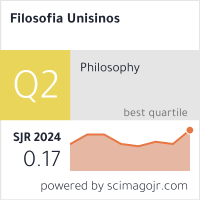Perceiving mental states: Co-presence and constitution
DOI:
https://doi.org/10.4013/fsu.2017.182.03Resumen
Recently, several philosophers have called attention to the idea that there are occasions on which we can perceive (at least some) mental states of others. In this paper we consider two recent proposals in this direction: the co-presence thesis (Smith, 2010) and the hybrid model (Krueger and Overgaard, 2012). We will examine the aforementioned alternatives and present some objections to both of them. Then, we will propose a way of integrating both accounts which allows us to avoid such objections. Broadly stated, our idea is that by perceiving other people’s behaviors we also perceive their mental states because behaviors co-present some features of the latter, and that this perception of others’ minds is direct and immediate because behavior is a constitutive part of the mental states in question.
Keywords: mindreading, hybrid model, direct perception of other minds, co-presence thesis.
Descargas
Descargas
Publicado
Cómo citar
Número
Sección
Licencia
Concedo a revista Filosofia Unisinos – Unisinos Journal of Philosophy o direito de primeira publicação da versão revisada do meu artigo, licenciado sob a Licença Creative Commons Attribution 4.0 (que permite o compartilhamento do trabalho com reconhecimento da autoria e publicação inicial nesta revista).
Afirmo ainda que meu artigo não está sendo submetido a outra publicação e não foi publicado na íntegra em outro periódico e assumo total responsabilidade por sua originalidade, podendo incidir sobre mim eventuais encargos decorrentes de reivindicação, por parte de terceiros, em relação à autoria do mesmo.










